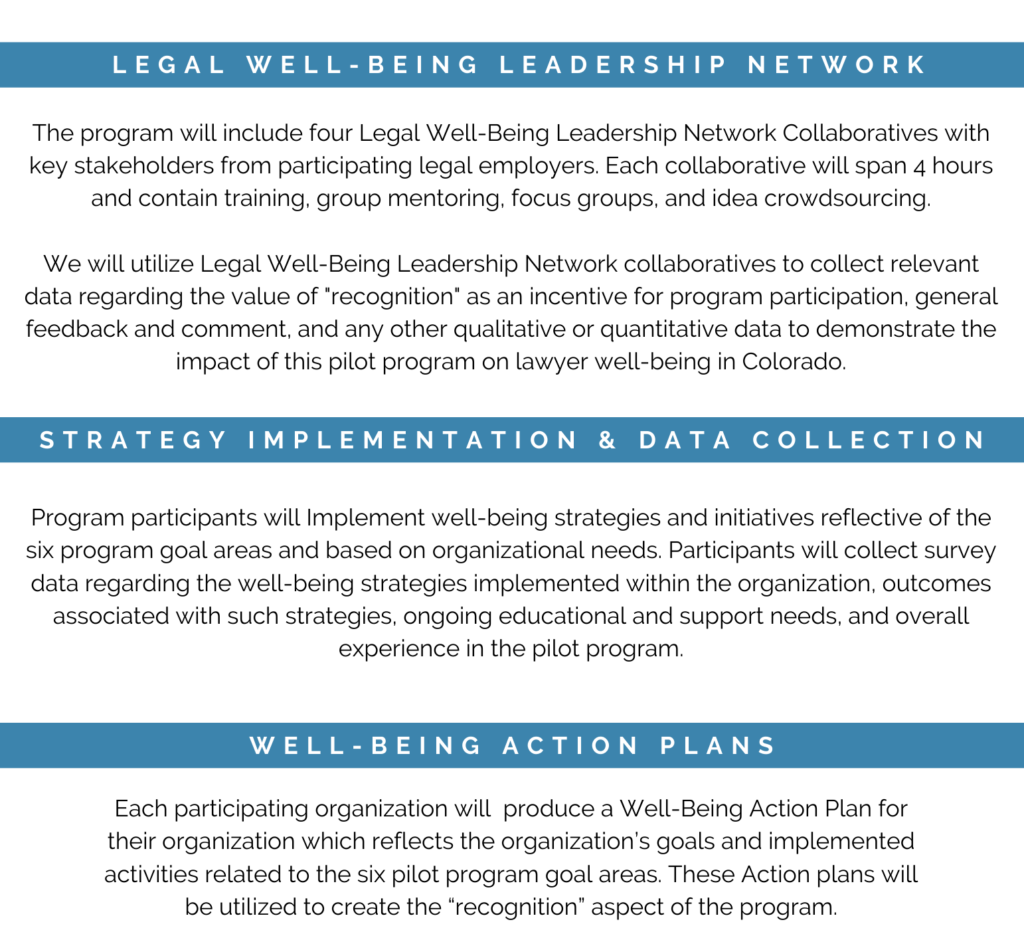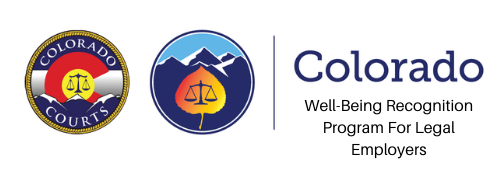
Pilot Program Components
Pilot Program Goals
The Pilot Program aims to develop, organize, and implement a sustainable and effective Well-Being Recognition Program for legal employers seeking to implement and improve well-being strategies and initiatives within their organizations. The specific pilot program goals are as follows:
- Develop the practical components of a state-wide Legal Employer Well-Being Recognition Program including program branding, communications strategies, reporting tools, and recognition mechanisms.
- Engage at least 25 Colorado legal employers (including solo-practitioners) in promoting or improving well-being within their organizations by implementing well-being strategies from each of six program goal areas.
- Host a minimum of 4 Legal Well-Being Leadership Network collaboratives with key stakeholders from participating legal employers to engage in dialogue and shared learning about lawyer well-being.
- Utilize Legal Well-Being Leadership Network collaboratives to collect relevant data regarding the well-being strategies implemented by participants, outcomes associated with such strategies, the value of “recognition” as an incentive for program participation, general feedback and comment, and any other qualitative or quantitative data to demonstrate the impact of this pilot program on lawyer well-being in Colorado.
- Demonstrate, through proof of concept, the efficacy and feasibility of a formal Colorado Supreme Court Recognition Program to provide well-being leadership and capacity building to Colorado’s legal community.
Pilot Program Outcomes
In completing pilot program goals, we aim to achieve the following:
- Develop an effective operational plan for the program which encompasses program objectives, service delivery methods, key performance indicators, evaluative criteria, and administrative sustainability considerations.
- Create a “Legal Well-Being Leadership Network” with related curriculum customized to the unique needs of legal employers of various sizes, demographics, geography, and practice settings.
- Identify and activate influential legal community leaders to serve as ambassadors and communication conduits for well-being initiatives on behalf of the Colorado Supreme Court.
- Refine well-being strategies, best practices, tools, and recommendations within the six goal areas to serve legal employers of various sizes, demographics, geography, and practice settings.
- Leverage “recognition” as a meaningful business incentive for solo-practitioners and larger legal employers to commit to promoting and improving lawyer well-being within their organizations.
- Deliver to the Colorado Supreme Court (for implementation and scaling) a robust model “Colorado Well-Being Recognition Program For Legal Employers” applicable to a diverse cross-section of legal employers with demonstrable positive impact on lawyer well-being.
Six Goal Areas of Well-Being
- Create a Culture of Well-Being Through Leadership, Accountability and Buy-In.
Well-being occurs from the top leadership through the rest of the legal organization. A committed law firm equity owner or committee including equity owner(s) should be responsible for developing an attorney well-being program with appropriate buy-in from attorneys throughout the firm. Likewise, leaders in other legal organizations must be involved. Goals should be developed along with assessment tools.
2. Foster Competence by Developing and Supporting Programs on Substantive Development and Mentoring.
Professional development is an investment that pays off for legal employers on many levels: it enhances competence and effectiveness of lawyers, instills a sense of dedication and belonging, and this demonstrated support can improve overall morale and well-being.
3. Develop Work-Life Integration and Flexible Work Schedules.
Flexible work arrangements respect lawyers’ desire for autonomy and some measure of control over professional and personal lives. There are multiple ways that legal employers can convey that work-life integration is not just accepted, but expected.
4. Promote Diversity and Inclusivity to Increase Organizational Success and Well-Being.
Organizations should promote diversity, inclusion and equity, not just as good business practices, but because they contribute significantly to attorney well-being. Organizations should recognize that increasing cultural competence and providing welcoming environments will lead to increased attorney wellness and retention.
5. Assess Compensation Metrics to Promote Well-Being.
Consideration should be given to alternative ways to compensate lawyers and staff for performance rather than focusing on the billable hour exclusively. Moving away from this single metric can decrease stress on employees, promote greater productivity, and bolster recruitment and retention of lawyers who have families, plan to start families, are required to care for family members or may be close to retirement.
6. Make Clients Part of the Conversation About Well-Being.
Enhanced lawyer well-being means better organizational success and thus, better service to clients. Many clients believe in a culture of well-being for their employees and should expect the same standard from their lawyers. Legal organizations must communicate to clients their commitment to and the value of lawyer well-being. Partnering with clients on well-being strategies can cement the lawyer-client relationship and promote buy-in by all parties. The collective purpose of these recommendations is to encourage law firms and legal offices in Colorado to address attorney well-being proactively. It matters to lawyers, it matters to clients, and it matters to the future of the legal profession.
Pilot Program Components

Pilot Program Time Investment
Leadership Collaboratives ~ 16 Hours
Organizational Strategy Implementation & Data Collection ~ 24-60 Hours
Well-Being Action Plan ~ 3 Hours
Focus Groups (Optional) ~ 4 Hours
Total 12 Month Time Commitment = 50 – 80 Hours



